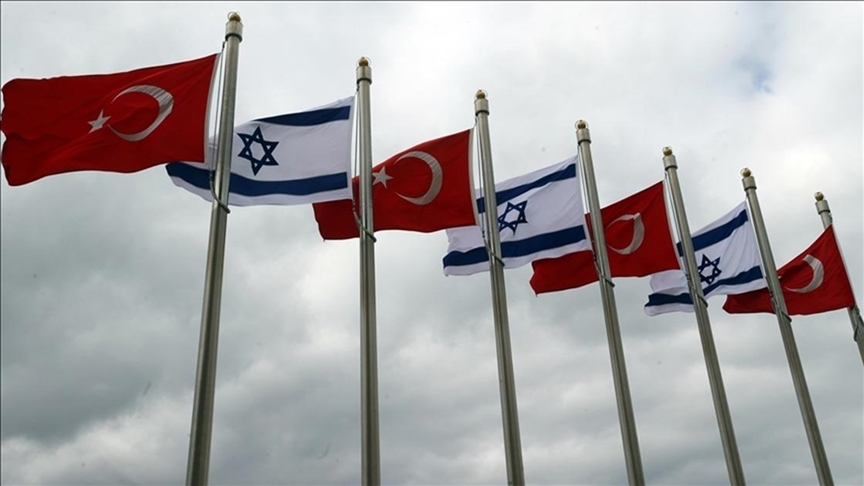ISTANBUL
Energy cooperation will be one of the facets of the rapprochement between Israel and Türkiye, said an expert, as the two countries last week agreed on restoring full diplomatic ties and reappointing ambassadors.
“Western capitals also want to diversify and enrich their energy supplies. And Türkiye-Israel cooperation may fulfill these demands and needs,” Cagri Erhan, a member of the Presidential Security and Foreign Policy Committee, told Anadolu Agency in an interview.
Asked how the normalization between Türkiye and Israel will affect energy supply security in the region, which has become vital following Russia’s war on Ukraine, Erhan, who is also a professor of international relations and the rector of Istanbul’s Altinbas University, said Türkiye and Israel have had “intensive ties”, particularly in the area of energy cooperation in the Eastern Mediterranean for the past two years.
“Not only searching and drilling the hydrocarbon reserves, but also transporting these reserves through Türkiye is an option for Israel,” he continued.
According to Erhan, there have been some contacts between the energy ministers of Türkiye and Israel, and they have started thinking about the possibilities of the transportation of Israeli natural gas through Türkiye.
Eastern Mediterranean
Greece, Israel, and the Greek Cypriot administration inked an agreement in 2020 to build a 1,900-kilometer (1,200-mile) natural gas pipeline to connect the reserves of the Eastern Mediterranean to Greece and then to Italy.
Many experts have said the estimated natural gas transfer cost would be cheaper if the pipeline passes through Türkiye.
“Particularly, after the United States pulling back its support for East Med project, Turkish option became the more feasible and only option for the reasonable transport of Israeli gas,” Erhan told Anadolu Agency.
On the Eastern Mediterranean, Erhan said that Türkiye is taking “very enthusiastic” steps for searching hydrocarbon reserves in the area, recalling the recent shipment of the Abdulhamid Han, Türkiye’s fourth drill ship.
“If Türkiye will discover some reserves in the area, then it needs more international cooperation to sell this to the European markets. And most probably this cooperation may come from Israeli companies and the Western companies,” he continued.
Erhan said that both Israel and Türkiye would see an “extremely positive impact” on their economies, particularly amid the war in Ukraine, at a time the Western European energy supply is under threat.
“And in future, there would be another architecture of energy cooperation, which will be fostered by cooperation between Israel and Türkiye,” he said.
Asked about the other outcomes of the normalization process, Erhan recalled Israel’s improving relations with its Arab neighbors, except Syria, following the Abraham accords, and added that this would make Türkiye take more warmer steps in the region.
Erhan said that trade between Türkiye and Israel has never diminished, and even tripled in terms of volume.
“Therefore, the positive impact of trade relations will also make it easy to foster diplomatic relations,” he continued.
Türkiye’s support for Palestine
Both the Turkish president and the foreign minister have stressed that normalization with Israel would not diminish Türkiye’s support for the Palestinian cause.
Asked how the Israeli-Turkish rapprochement will benefit the Palestinians, Erhan said Palestine has always been” the number one beneficiary” from the cooperation between the two countries.
He said that Türkiye could play the role of “an honest broker” if it has good relations with Israel.
“I remember in 2008-2009, Türkiye was the country who brought the representatives from Palestinians and Israelis to negotiate about the possibilities for a peace process,” he said, adding that Palestinian President Mahmoud Abbas also underlined the importance of Turkish-Israeli dialogue during his visit to Ankara this week.
“Türkiye will remain as a country who will recognize Tel Aviv as the official capital of Israel, Türkiye will remain as the country who will recognize Eastern Jerusalem as the official capital of Palestinian state, and Türkiye will never recognize the occupation and annexation of both West Bank and Golan Heights,” Erhan said.
Normalization with other countries in the region
Besides Israel, Ankara appears to have been working on opening a new chapter in its relations with other countries in the region, including the United Arab Emirates, Egypt, Saudi Arabia, and Armenia.
Asked whether these efforts are part of a general policy stance by Türkiye to improve relations with its region or should they be seen separately on a more case-by-case basis, Erhan answered: “This is of course out of a general approach. But on the other hand we should accept that some conditions have dramatically changed to open new relations with some countries.”
For instance, he said the normalization process with Armenia would not have been possible if Azerbaijan had not liberated its lands in Karabakh from Armenian occupation.
Similarly, Israel’s softening its relations with its Arab neighbors also helped Türkiye open a new page in relations, according to Erhan.
“Therefore, it coincided with Türkiye’s new enthusiasm to create normalization with all of its neighbors and other countries, but also the conditions made it possible,” he said.

